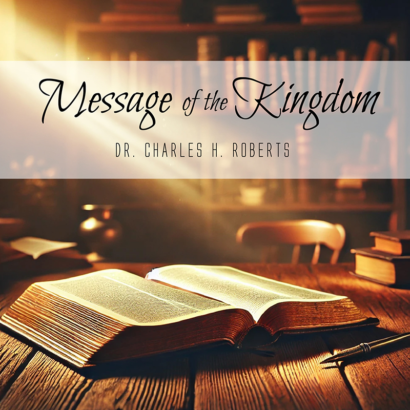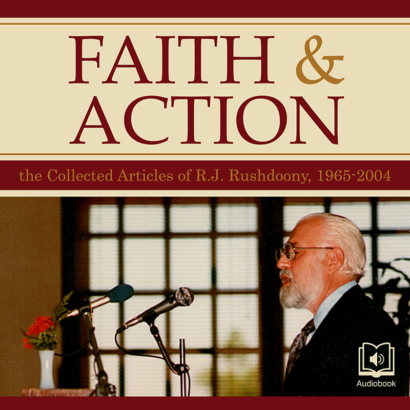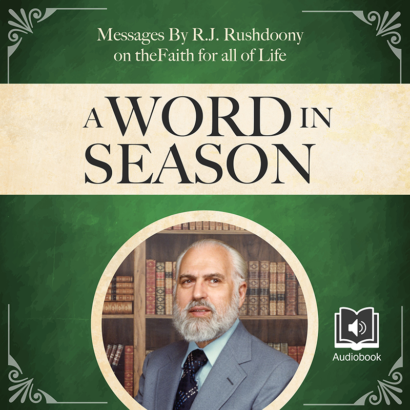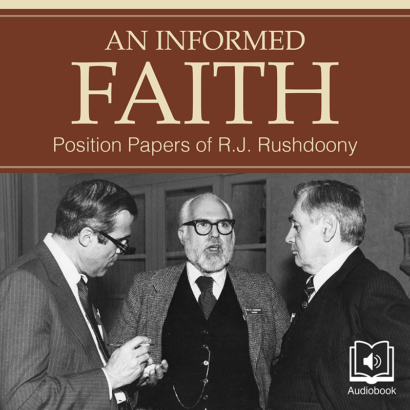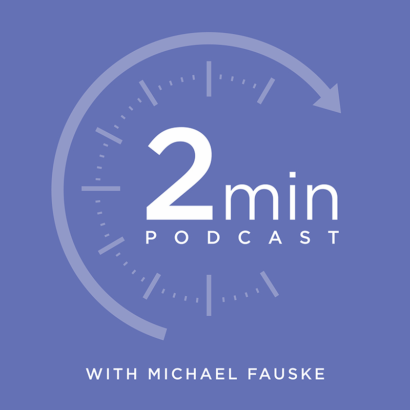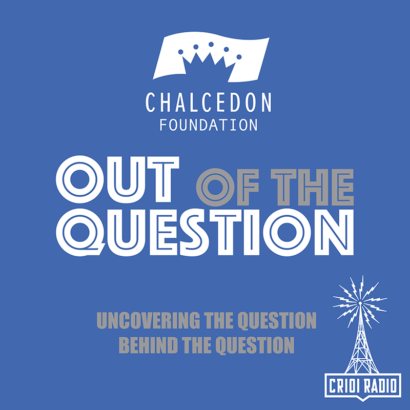
Effectual Calling (The Doctrine of Salvation)
• Jun, 25 2024
Join R.J. Rushdoony for another sermon in his lecture series, " The Doctrine of Salvation!"
Hosted by
Chalcedon Founder
- Series: Rushdoony Radio
- Topics:
Effectual Calling
R.J. Rushdoony
Our subject is ‘effectual calling.’ Paul declares in Romans 8:28-30:
“And we know that all things work together for good to them that love God, to them who are the called according to his purpose. For whom he did foreknow, he also did predestinate to be conformed to the image of his Son, that he might be the firstborn among many brethren. Moreover whom he did predestinate, them he also called: and whom he called, them he also justified: and whom he justified, them he also glorified.” 1
Now, the word ‘call’ in the New Testament is the Greek ‘kaleō.’ Our very word call comes from that word, which means to call, to summon, or to invite. Now, an important thing about this word which is generally neglected is this. The force of the word depends upon the caller. Let me repeat that. The force of the word depends upon the caller. Thus, if I issue a call, it is an invitation. If a judge issues a call, the force of the word then is a summons, an order. When a king issues a call, again, it has the same force, it is a summons, a command, it cannot be resisted. Thus, God’s calling is a command.
Moreover, depending again upon the caller, the Greek word can mean to be called or destined, appointed, chosen. Now, God’s calling is effectual, because God is absolutely effectual. God’s calling is sovereign because God is the absolute sovereign. So that when God calls, His calling is a summons and a command, and it determines, and predestines as well. Hence, when Paul speaks of calling, he says:
“Moreover whom he did predestinate, them he also called: and whom he called, them he also justified: and whom he justified, them he also glorified.”
There is no halting. There is no slip-up. Nothing anywhere along the line. What God does is done.
Now, the Westminster Confession in the tenth chapter, the second section, identifies regeneration and effectual calling. It declares:
“This effectual call is of God’s free and special grace alone, not from any thing at all foreseen in man, (2 Tim. 1:9, Tit. 3:4–5, Eph. 2:4–5, 8–9) who is altogether passive therein, until, being quickened and renewed by the Holy Spirit, (1 Cor. 2:14, Rom. 8:7, Eph. 2:5) he is thereby enabled to answer this call, and to embrace the grace offered and conveyed in it. (John 6:37, John 5:25)” 2
Very clearly, there is this identification between regeneration and effectual calling in Romans 8:30. But in other passages, and with Reformed scholars generally, a distinction is made. Regeneration is the begetting again, the being born again, the beginning of the call, whereas, the calling is more inclusive.
However, at this point, there is a serious problem, and there is a very, very serious error in a great deal of Reformed thinking. The error is in restricting the calling to being chosen. Now, this is an important point to recognize. Because so many of the traditional Reformed and/or Presbyterian churches have been prone to this error on calling, that is, they restrict it to being chosen, it leads to a spiritual pride. “We are the elect, we are the chosen of God.” And thus it is, there is a stagnation in so many of the Presbyterian and Reformed churches, a deadness, an inability to see any good outside of their circle, an inability to be ablaze with a concern for God’s work.
The point of effectual calling is that we are not the focus, and when effectual calling is limited to being chosen, what it says is that effectual calling means that I am the elect, and so man makes himself the goal and the be-all of God’s predestination and his calling, but we are not the focus. The purpose of God goes beyond our being chosen, and our being chosen is merely an instrument for God’s purposes. Our Lord makes this abundantly clear in the verse in which the writers of the Westminster Confession stressed. John 15:16, one of the great texts on calling.
“Ye have not chosen me, but I have chosen you, and ordained you, that ye should go and bring forth fruit, and that your fruit should remain: that whatsoever ye shall ask of the Father in my name, he may give it you.” 3
Now, what does this tell us about calling? First of all, our Lord here, very definitely declares that the calling, the choosing is entirely of God. He is the Lord. He is the sovereign. He alone can summon man into his presence, and there is no entering until invited. It is not man that chooses the Lord, but the Lord who chooses man.
“Ye have not chosen me, but I have chosen you.”
But second, the purpose of our calling is not to be chosen but to bear fruit, to be productive to the Lord and his kingdom.
“Ye have not chosen me, but I have chosen you, and ordained you, that ye should go and bring forth fruit…”
Now, do you see the error and evil in seeing effectual calling as being chosen? That’s not the focus. The focus is not on man, it is on going forth and bearing fruit for the kingdom, for the Lord:
“I have chosen you, and ordained you, that ye should go and bring forth fruit…”
This is extremely important.
Last Sunday, June 3, 1979, as I was driving home from Los Angeles, I heard, well, one of the more important radio Bible broadcasts in this country, and the title looked very promising. It was Kingdom Builders. But the sermon was very disappointing, because who are the kingdom builders and what is kingdom building? The pastor went on to define them. They are those who are ministers and missionaries, who are church officers, and Sunday School teachers, and work in the women’s work, and those who pray for the pastor and all the missionaries, and the church workers, and are active in the support of the church.
In other words, kingdom building was limited to the institutional church! Nothing said about going out into all the vocations. The doctor who is a Christian doctor who works to roll back the power of sin and death in his domain is kingdom-building. A plumber who advances progress and better living in terms of God’s kingdom, and in terms of his law is a kingdom-builder. In fact, a lot of plumbers in the recent years have been better kingdom builders than most pastors. Our calling in Christ is in every area, in every kind of vocation. We cannot limit it to the institutional church. After all, the original calling of man was of Adam in the Garden of Eden to be a farmer. The first calling God gave a man, to be a farmer, and secondarily, a cattleman. Adam was not called to be the Rev. Dr. Adam of the First Church of Eden.
And how is man called? The Westminster Confession, Chapter 10, section one states it very beautifully.
“All those whom God hath predestinated unto life, and those only, He is pleased, in His appointed and accepted time, effectually to call, (Rom. 8:30, Rom. 11:7, Eph. 1:10–11) by His word and Spirit, (2 Thess. 2:13–14, 2 Cor. 3:3,6) out of that state of sin and death, in which they are by nature to grace and salvation, by Jesus Christ; (Rom. 8:2, Eph. 2:1–5, 2 Tim. 1:9–10) enlightening their minds spiritually and savingly to understand the things of God, (Acts 26:18, 1 Cor. 2:10,12, Eph. 1:17–18) taking away their heart of stone, and giving unto them an heart of flesh; (Ezek. 36:26) renewing their wills, and, by His almighty power, determining them to that which is good, (Ezek. 11:19, Phil. 2:13, Deut. 30:6, Ezek. 36:27) and effectually drawing them to Jesus Christ: (Eph. 1:19, John 6:44–45) yet so, as they come most freely, being made willing by His grace. (Cant. 1:4, Ps. 110:3, John 6:37, Rom. 6:16–18)” 4
Effectual calling, in other words, is an act of God, which whether gradual or sudden, is at one and the same time both completely supernatural and natural, and is at every point, the work of the Lord. After all, God’s power is as total in the natural realm as in the supernatural. And God uses everything in our lives providentially to bring us to that point and to call us in terms of his purpose, and everything in our lives up to that point has been for the purpose of his calling, so that we might serve Him as He purposes.
Now, when man is called, whether to be a pastor or a doctor, or a dentist, or a cattleman or a farmer, or a plumber, or a scientist, and when he is saved, the beginning of his call, his regeneration, God doesn’t come and tap him on the shoulder and say, “Look, you’re now saved, and this is the spot I’ve picked for you, and the vocation (or calling) I have picked for you.” No. Rather God guides us step by step, so that we move naturally now, being the Lord’s to do what we do for him. So that whatever we do, wherever we are, if we are faithful to him and his word, we manifest his effectual calling. Our calling to our salvation and service are alike natural and supernatural, and everything that we do serves his kingdom. After all, even the work of the Gentiles, the ungodly, will serve him. Isaiah 61:6 declares:
Ye shall eat the riches of the Gentiles,
And in their glory shall ye boast yourselves. 5
Thus, we are called that we may go forth and bear fruit.
But then, third, our Lord says something further:
“...that your fruit should remain.”
That’s a magnificent promise. Outwardly, it may disappear. My father, in his lifetime, helped as pastor, three times building projects, to get churches built. Now, as the years have passed, I believe all three churches are gone, that is, the buildings, but the work remains. What God intended was accomplished. Paul says:
“Therefore, my beloved brethren, be ye stedfast, unmoveable, always abounding in the work of the Lord, forasmuch as ye know that your labour is not in vain in the Lord.” 6
There is no futility in our calling. Troubles, yes, but no futility. Our calling is a royal summons, a command, a decree, and because it is ordained and decreed by God, it is an effectual calling. God determines the call and he determines the effectualness of it.
Now, a command from the throne requires diligence. Our Lord in more than one parable, stresses the necessity of diligence, when God, when the Lord, issues a command. He also stresses the certainty when we move by faith and in obedience to him of conquest and of triumph.
To cite again Joshua 1:3 and 5:
“Every place that the sole of your foot shall tread upon, that have I given unto you.”
“I will not fail thee, nor forsake thee.”
Verses which Paul quoted in Hebrews 13, I believe verse 6.
Then finally, as our Lord speaks:
“Ye have not chosen me, but I have chosen you, and ordained you, that ye should go and bring forth fruit, and that your fruit should remain: that whatsoever ye shall ask of the Father in my name, he may give it you.” 7
We have a fact of prayer. We have been chosen, not for our purpose, and we are to pray not for our purpose, but in His Name. In terms of His power and His kingdom, and His purpose, and our place in it, and our service to Him, and we are to pray in terms of confidence in His effectual calling, and in His sovereign purpose. We are to pray in terms of His grace and His kingdom, in terms of the guarantee of our productivity and of our rule in Him. So, we pray, not in terms of ourselves as the focus, but in terms of His calling, His kingdom, and our productivity in terms of it.
Effectual calling, thus, does not make us the center. We are not chosen and that’s the end of our effectual calling. It’s the beginning. Regeneration means that we have been called and chosen, but only for God’s purpose, not so we can sit back and say, “well, I’ve got the issue of Heaven settled. God chose me, he did it, and now I can relax, I am safe for eternity, I’ve got life and fire insurance, and nothing to worry about.” No. When we are called by the Lord, we are commissioned to go forth into that area of life and though which is our place under his purpose, and there to bear fruit under him, and there to be diligent in service and in prayer, that His will be done. And we are told to pray, and our Lord himself gives the model of the prayer saying.
“After this manner therefore pray ye: Our Father which art in heaven, Hallowed be thy name. Thy kingdom come. Thy will be done in earth, as it is in heaven. (and then we come into the prayer) Give us this day our daily bread.” 8
Have you ever considered the implication of that? Not: “Give me security for the rest of my life so that, give me for the rest of my life my daily bread, a guaranteed insurance policy, Lord, and then it will be safer, easier for me to serve you. If I’m really your chosen, give me that policy. I want it signed, sealed, and delivered.” No. “thy kingdom come, thy will be done,” and where do I come in?
“Give us this day our daily bread.”
We definitely come in a very poor second, because we are not called, we are not chosen for ourselves, but for His purpose. And today, too many people go to church in terms of what can the church do for my needs? Our needs, whether they be material or spiritual, are a very poor second to God’s purpose, God’s requirement, and we are saved, regenerated, and called to bear fruit to him. This is the purpose and the meaning of our life. But if we try to find the purpose in terms of our security, our will being done, then we have turned our back on the Lord and we have created an idol, using the words of the Bible, and it is not the living God whom we serve.
Are there any questions now?
* * *
No questions?
Yes?
[Audience] Well, Rush, how can a minister, in just a matter of three or four sentences, say that God called you by his Holy Spirit. He called you and you shouldn’t reject the Holy Spirit, but the very next sentence is will say that God will not force himself upon you. Isn’t that kind of contradictory?
[Rushdoony] Yes.
[Audience] I’ve heard that cliché a number of times from these gentlemen.
[Rushdoony] Yes, it is. God does not do violence to our will, but he completely determines our will.
[Audience] The problem is that when people speak of free will, they think of man as being independent or autonomous. And you have pointed out previously, that man makes it almost as if man makes decisions without any reference to his dependency as creature, and that’s just not the case. As Herman Bavinck, a great Dutch Reformed theologian, pointed out, free will in the Bible is simply the fact that God has given us minds to think with, to make wise decisions and we act, and we exercise dominion, but all of that is within God’s plan.
[Rushdoony] The Bible never even uses the term ‘free will.’ It only uses the terms of responsibility and accountability, that we must stand before the Lord as judge, in other words. God alone has absolute free will. Ours is the freedom of a creature, which is a very different thing.
Yes?
[Audience] It seems to me really the issue between God’s sovereignty and the sovereignty of man in saying that man has a free will to determine his own destiny.
[Rushdoony] It’s saying that man is God.
Yes?
[Audience] Besides, they don’t realize they’re saying two things in the same, what, three minutes?
[Rushdoony] They do, yes. They’re halting between two opinions.
[Audience] I had a friend who wrote a letter to the president of a very well-known seminary in this country about this very issue, and he wrote back and said, “Well, I believe in a sovereign work of God in salvation. That’s very true, but there’s also a sovereign work of man.” And then when he was confronted with this and accused of being a synergist, that is, that it’s just not God working, but that man works, too, he said, “Oh, I’m not a synergist. I don’t believe that.”
[Rushdoony] Well, if there are no further questions or comments, let’s bow our heads now in prayer.
* * *
Our Lord and our God, we thank thee for our fellowship in thee. Dismiss us with thy blessing. Give all traveling mercies as they journey homeward, a blessed night’s rest, and joy in thee day by day. In Jesus name. Amen.
1 Ro 8:28–30.
2 The Westminster Confession Of Faith. (1996). Logos Research Systems, Inc.
3 Jn 15:16.
4 The Westminster Confession Of Faith. (1996). Logos Research Systems, Inc.
5 Is 61:6.
6 1 Co 15:58.
7 Jn 15:16.
8 Mt 6:9–11.
More podcasts in series

The House of God (Doctrine of the Church)
Aug 12, 2025

The Holy Assembly (Doctrine of the Church)
Aug 07, 2025

The Assembly or Congregation (Doctrine of the Church)
Aug 05, 2025

The Sabbath (Doctrine of the Church)
Jul 31, 2025

The Passover (Doctrine of the Church)
Jul 29, 2025

Training for Government (Doctrine of the Church)
Jul 24, 2025

Government (Doctrine of the Church)
Jul 22, 2025

Circumcision (Doctrine of the Church)
Jul 17, 2025

Faith and the Church (Doctrine of the Church)
Jul 15, 2025

Introduction to the Doctrine of the Church (Doctrine of the Church)
Jul 10, 2025

The Interpretation of History, II (American History to 1865)
Jul 08, 2025

The Interpretation of History, I (American History to 1865)
Jul 03, 2025

De Tocqueville on Democracy and Power (American History to 1865)
Jul 01, 2025

Sin and Sins (Doctrine of Sin)
Jan 30, 2025

The View of Sins as Virtues (Doctrine of Sin)
Jan 28, 2025

Fables (Doctrine of Sin)
Jan 23, 2025

Sin as a Political Asset (Doctrine of Sin)
Jan 21, 2025

Sin and False Perfectionism (Doctrine of Sin)
Jan 16, 2025

Sin and Matter (Doctrine of Sin)
Jan 14, 2025

Sin as Personal Fulfillment (Doctrine of Sin)
Jan 09, 2025

Sin and Society (Doctrine of Sin)
Jan 09, 2025

Sin as Deprivation (Doctrine of Sin)
Jan 09, 2025

Total Depravity (Doctrine of Sin)
Jan 09, 2025

The Origin of Sin (Doctrine of Sin)
Jan 09, 2025

The Religious Nature of Sin (Doctrine of Sin)
Jan 09, 2025

Man in 1984: Orwell (Aspects of American History)
Jan 09, 2025

Of the People, By the People, and For the People (Aspects of American History)
Jan 09, 2025

Volunteerism in American Politics vs. Humanist Elitism
Dec 12, 2024

America Belongs to Americas: Monroe Doctrine (Aspects of American History)
Dec 10, 2024

The American Indian (Aspects of American History)
Dec 05, 2024

A Return to Slavery (Aspects of American History)
Dec 03, 2024

The Certainty of Victory (Daniel: Thy Kingdom Come)
Dec 02, 2024

The Target (Daniel: Thy Kingdom Come)
Nov 26, 2024

Liturgy of the Messiah (Daniel: Thy Kingdom Come)
Nov 21, 2024

Confusion of Faces (Daniel: Thy Kingdom Come)
Nov 19, 2024

Perspective of History (Daniel: Thy Kingdom Come)
Nov 14, 2024

The Course of Dominion (Daniel: Thy Kingdom Come)
Nov 12, 2024

Sovereignty and Justice (Daniel: Thy Kingdom Come)
Nov 07, 2024

The Balances of Justice (Daniel: Thy Kingdom Come)
Nov 05, 2024

Ritual Center of the Earth (Daniel: Thy Kingdom Come)
Oct 31, 2024

The Continuation of God (Daniel: Thy Kingdom Come)
Oct 29, 2024

The Terror of Dreams (Daniel: Thy Kingdom Come)
Oct 24, 2024

The Offense of Daniel (Daniel: Thy Kingdom Come)
Oct 22, 2024

Authority and Life (The Doctrine of Authority)
Oct 17, 2024

The Power to Kill (The Doctrine of Authority)
Oct 16, 2024

Authority, Justice, and Men (The Doctrine of Authority)
Oct 10, 2024

Satanic Authority (The Doctrine of Authority)
Oct 09, 2024

The Seraphim (The Doctrine of Authority)
Oct 03, 2024

The Cherubim (The Doctrine of Authority)
Oct 01, 2024

Authority: Primary and Secondary (The Doctrine of Authority)
Sep 26, 2024

The Source of Authority (The Doctrine of Authority)
Sep 24, 2024

The Purpose of Authority (The Doctrine of Authority)
Sep 20, 2024

By What Authority?
Sep 17, 2024

Authority and Ministry (The Doctrine of Authority)
Sep 12, 2024

Authority and False Responsibility (The Doctrine of Authority)
Sep 10, 2024

Undermining Authority (The Doctrine of Authority)
Sep 05, 2024

Authority and Power (The Doctrine of Authority)
Sep 04, 2024

Living Under Authority (The Doctrine of Authority)
Aug 29, 2024

The Spirit of Adoption (The Doctrine of Authority)
Aug 27, 2024

The Power of His Resurrection (The Doctrine of Authority)
Aug 22, 2024

Man's Relationship to Authority (The Doctrine of Authority)
Aug 22, 2024

Author and Authority (The Doctrine of Authority)
Aug 22, 2024

Glorification: Part 4 (The Doctrine of Salvation)
Aug 13, 2024

Glorification: Part 3 (The Doctrine of Salvation)
Aug 08, 2024

Glorification: Part 2 (The Doctrine of Salvation)
Aug 06, 2024

Glorification: Part 1 (The Doctrine of Salvation)
Aug 01, 2024

Perseverance (The Doctrine of Salvation)
Jul 30, 2024

Preservation (The Doctrine of Salvation)
Jul 25, 2024

Sanctification (The Doctrine of Salvation)
Jul 23, 2024

Justification (The Doctrine of Salvation)
Jul 18, 2024

Conversion: Faith and Repentance (The Doctrine of Salvation)
Jul 16, 2024

Regeneration (The Doctrine of Salvation)
Jul 11, 2024

Predestination (The Doctrine of Salvation)
Jul 09, 2024

Election (The Doctrine of Salvation)
Jul 04, 2024

The Evangel or Gospel (The Doctrine of Salvation)
Jul 02, 2024

Polytheistic Salvation (The Doctrine of Salvation)
Jun 27, 2024

Cosmic Salvation (The Doctrine of Salvation)
Jun 20, 2024

Salvation: Anthropology or Theology? (The Doctrine of Salvation)
Jun 18, 2024

Humanistic Salvation (The Doctrine of Salvation)
Jun 13, 2024

Salvation (The Doctrine of Salvation)
Jun 11, 2024

Ordo Salutis: The Order of Salvation (The Doctrine of Salvation)
Jun 06, 2024

Foundations Tested (The Sermon on the Mount)
Jun 04, 2024

False Faith (The Sermon on the Mount)
May 30, 2024

The Test of Profession (The Sermon on the Mount)
May 28, 2024

The Narrow Way (The Sermon on the Mount)
May 23, 2024

The Golden Rule
May 21, 2024

The Assurance of Answers (The Sermon on the Mount)
Apr 30, 2024

Judging (The Sermon on the Mount)
Apr 25, 2024

Anxiety (The Sermon on the Mount)
Apr 23, 2024

Deliver Us From Evil (The Sermon on the Mount)
Apr 18, 2024

Debts (The Sermon on the Mount)
Apr 16, 2024

The Peacemakers (The Sermon on the Mount)
Apr 11, 2024

Blessed are the Pure in Heart (The Sermon on the Mount)
Apr 09, 2024

The Merciful (The Sermon on the Mount)
Apr 04, 2024

Whosoever Shall Compel Thee (The Sermon on the Mount)
Apr 02, 2024

Blessed (The Sermon on the Mount)
Mar 28, 2024

Little Faith (The Sermon on the Mount)
Mar 26, 2024

Foundations (The Sermon on the Mount)
Mar 21, 2024

The Unity of Life (The Sermon on the Mount)
Mar 19, 2024

Judgment and Action (The Sermon on the Mount)
Mar 14, 2024

Worry and Fretfulness (The Sermon on the Mount)
Mar 12, 2024

Rewards (The Sermon on the Mount)
Mar 12, 2024

Prayer (The Sermon on the Mount)
Mar 12, 2024

Christ and the Law (The Sermon on the Mount)
Mar 12, 2024

Salt, Light, and Law (The Sermon on the Mount)
Mar 12, 2024

The Beatitudes (The Sermon on the Mount)
Mar 12, 2024

